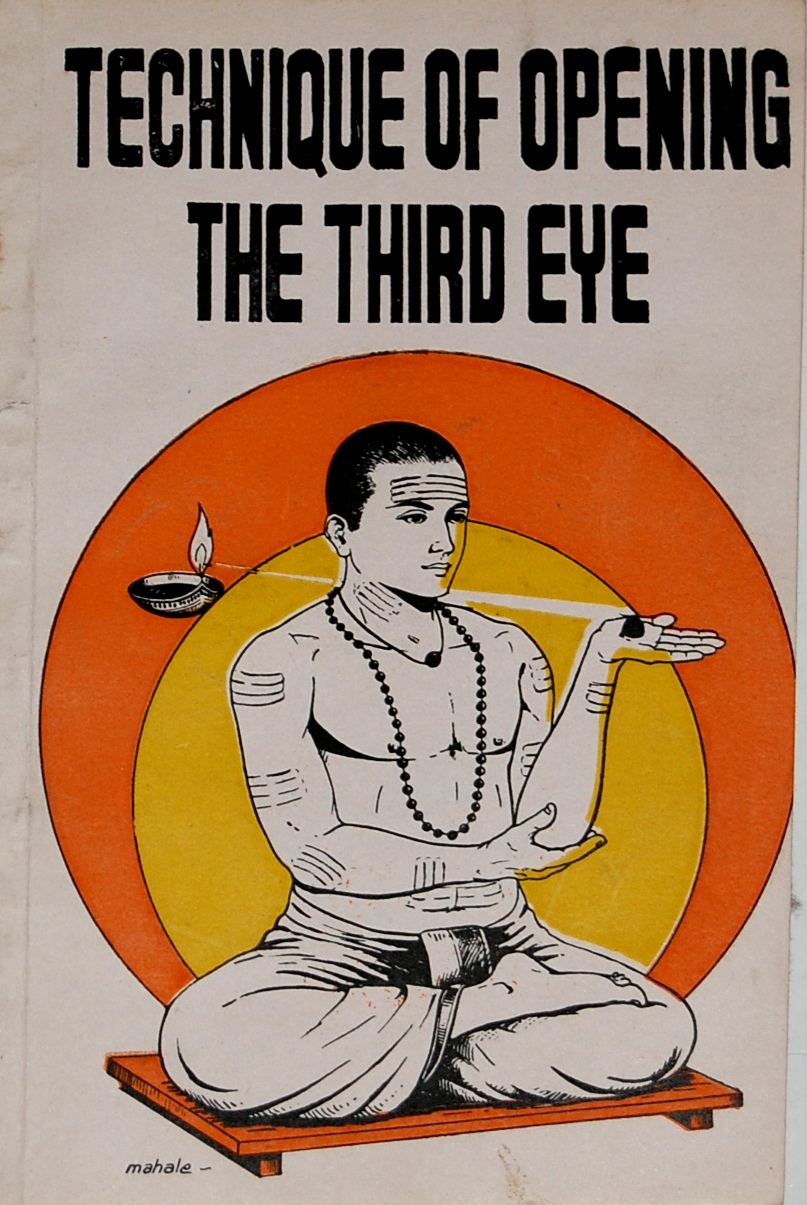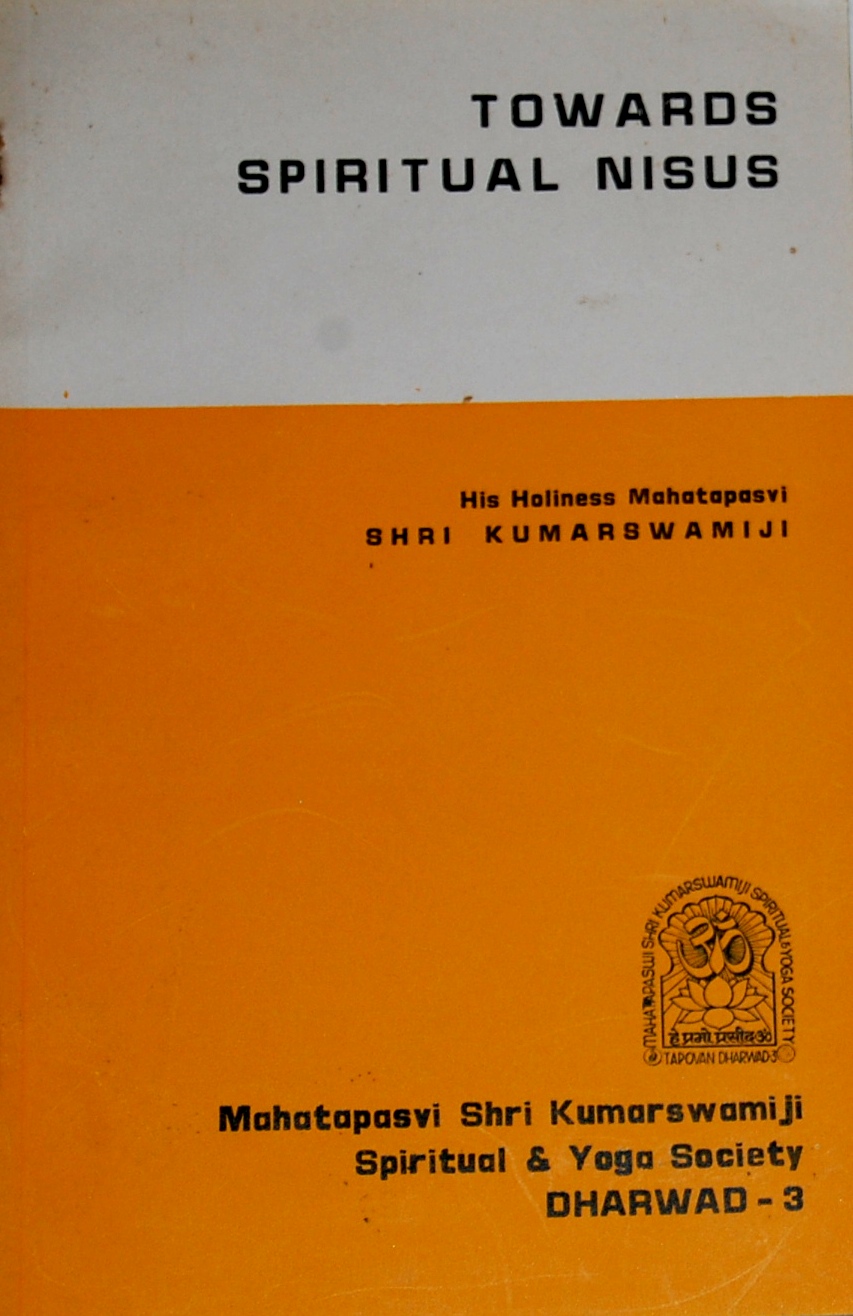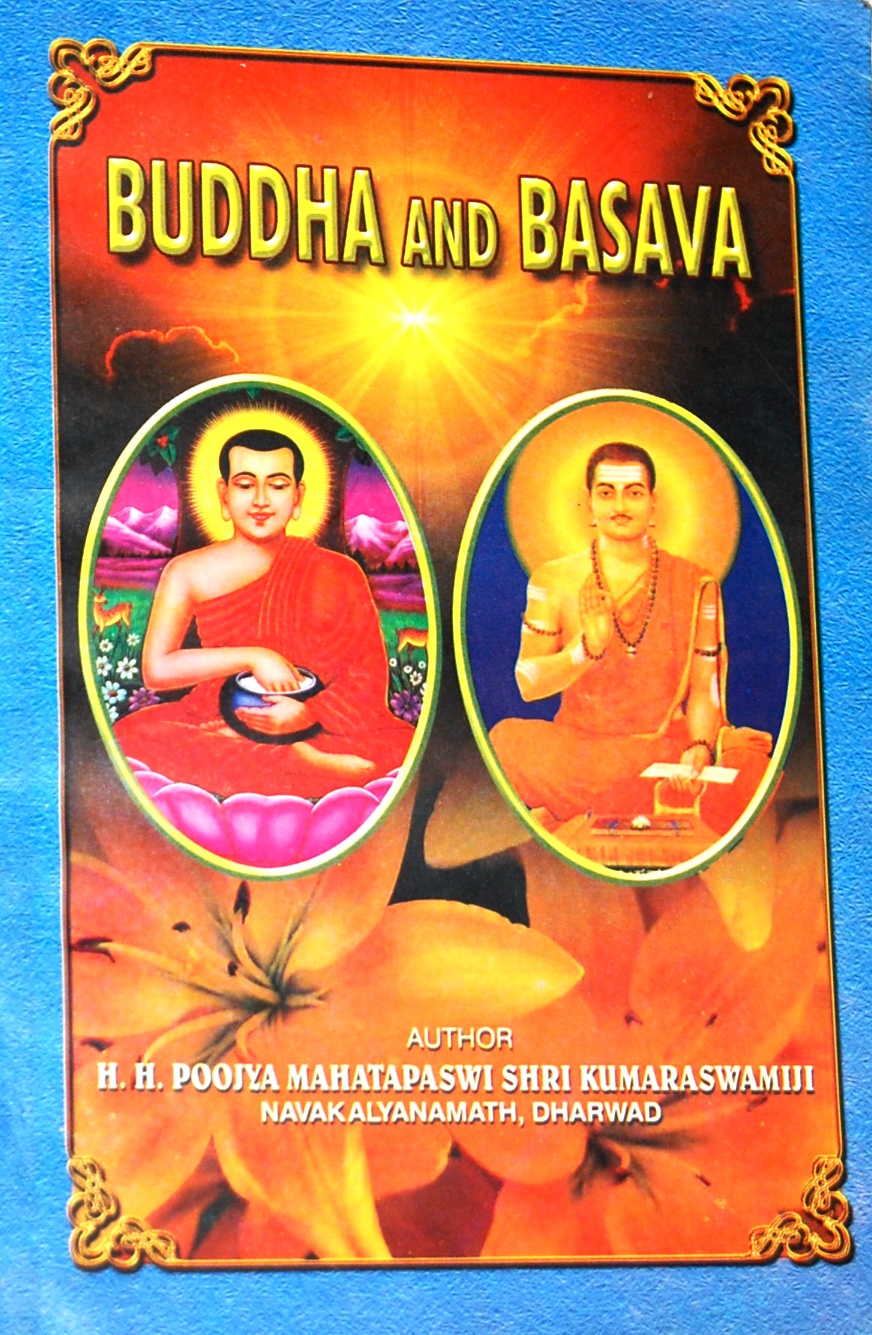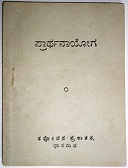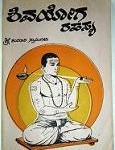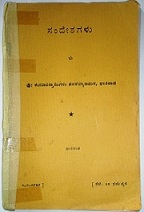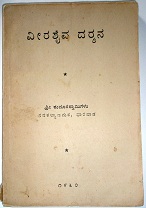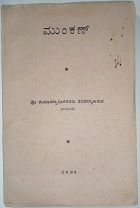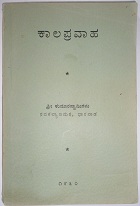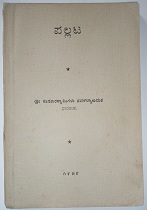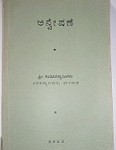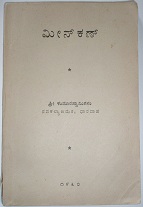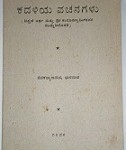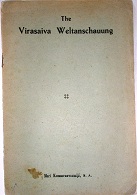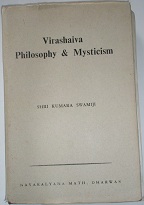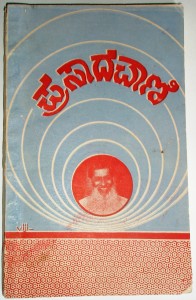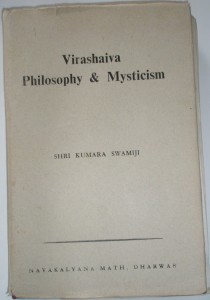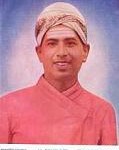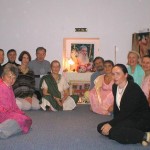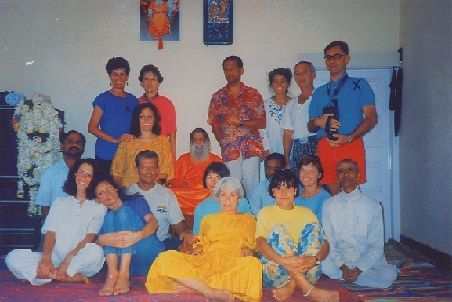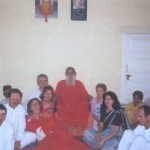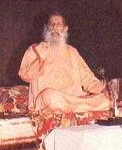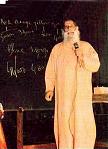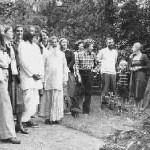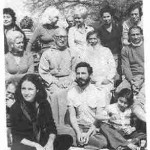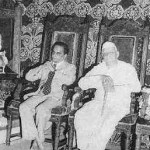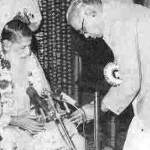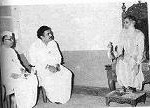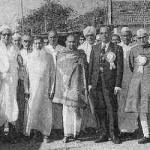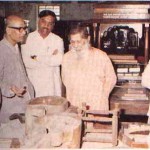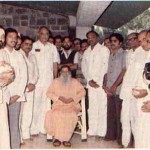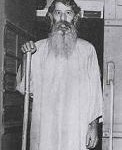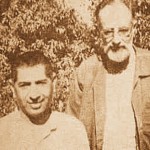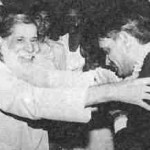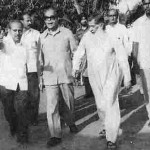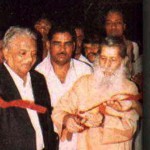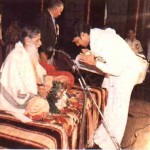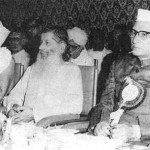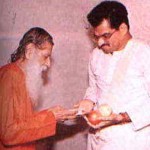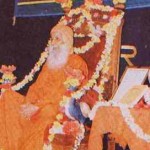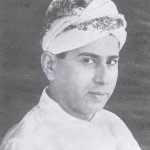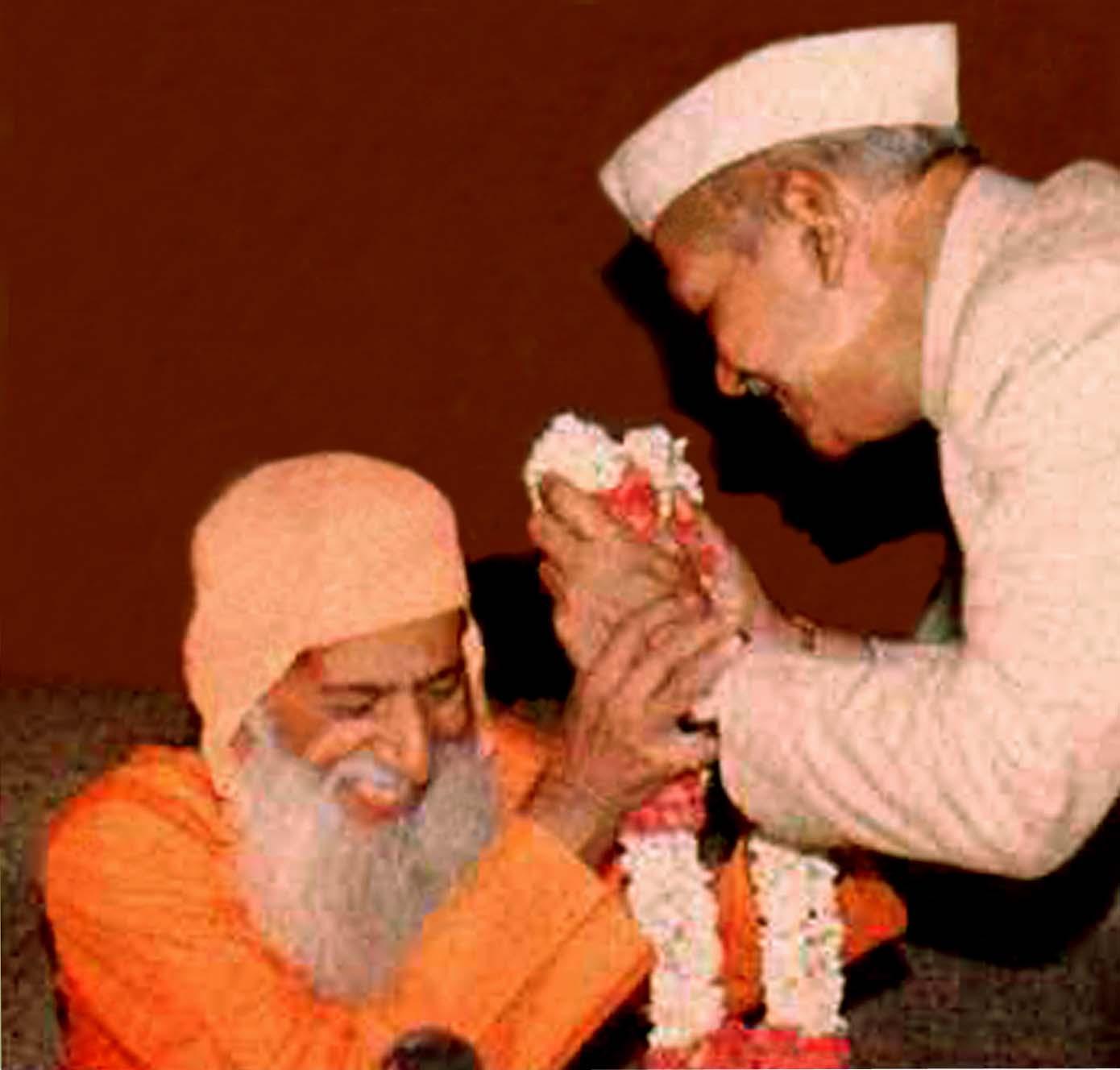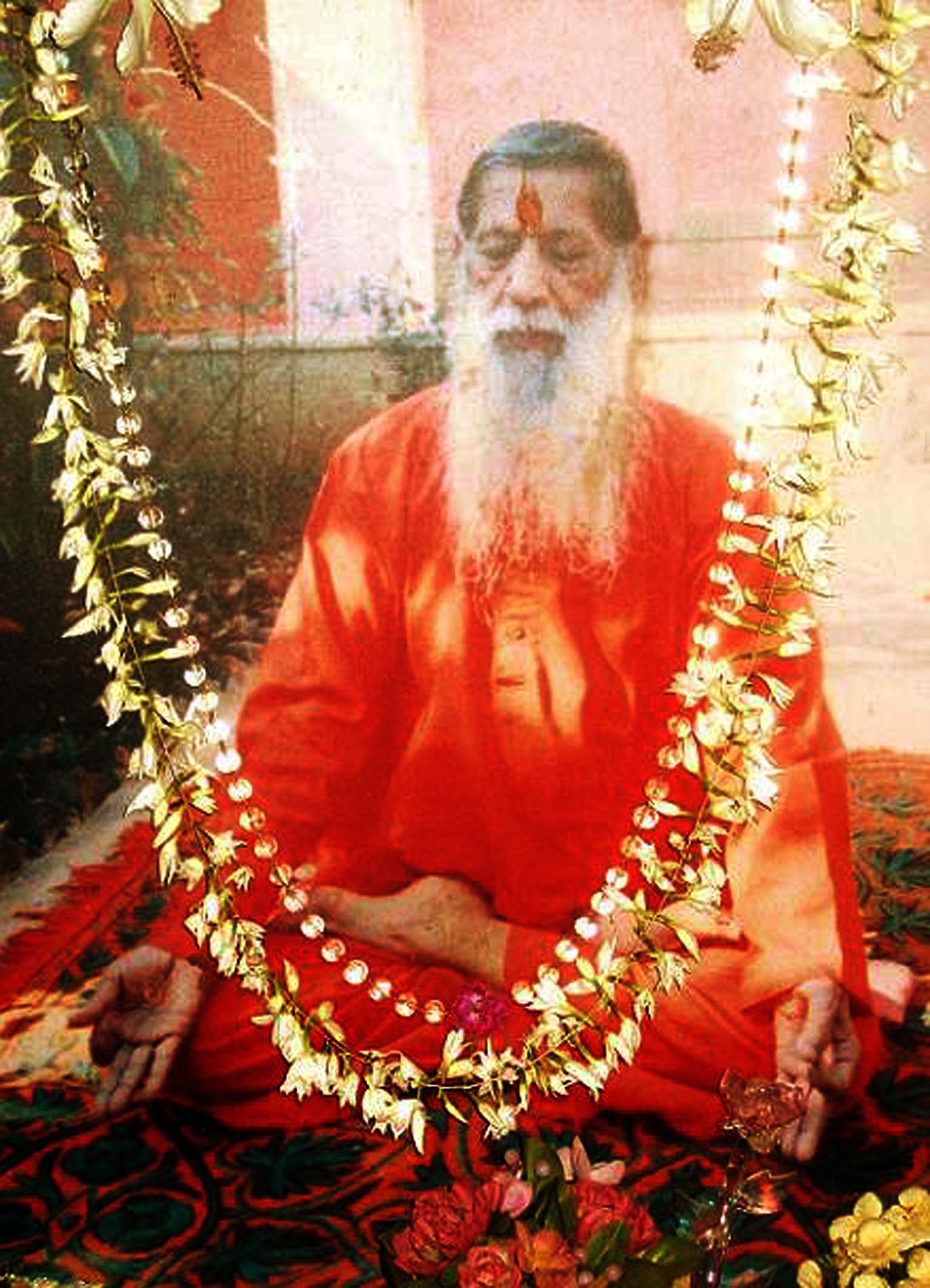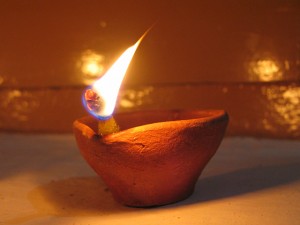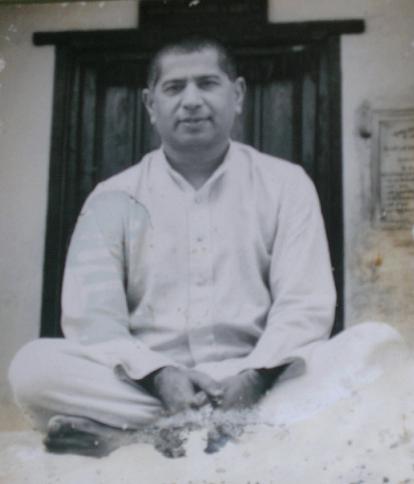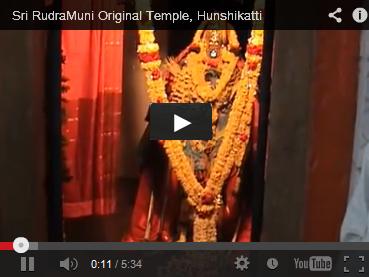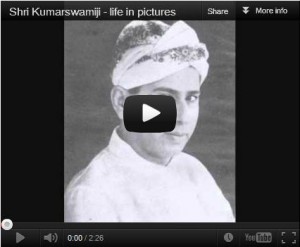The metaphysical reality of intuition, which is sadly neglected in contemporary philosophy, has been noticed and recognized with meticulous care by Allama and Aurobindo. Both are emphatic in saying that spiritual experience is direct or immediate, absolute and synthetic. Intuition is a universal process and as such it is the very act of evolving self-consciousness, varying as to the level of its manifestation but identical emanation of the self, expanding its life into the universe with a view to organize there an ever widening field of consciousness. But as a fact, a larger rhythm can be perceived, a broader vision of the oneness of life, be enjoyed. This double structure which renders the manifestation of spirit possible is not confined to man alone. It is found at every point of the vast sweep of universal life, in every kingdom of spiritual nature. Hence Allama and Aurobindo recognize as a process through which spirit manifests, identical in all stages of evolution.
Allama Prabhu and Aurobindo are exponents of a spiritual philosophy whose news of God; world and men are derived from a wealth of spiritual experience. Its exponents are yogis of the highest order who have shown wonderful insight into the abstract points of the metaphysics. It, therefore, embodies the finding of yoga or super normal experience. Means of apprehension, other than sensory and intellectual, have been recognized in Indian systems of philosophy. Various kinds of discipline, under the name of yoga, have been brought into bold relief to explicate the science of the inner being and nature of man, and to exploit the art of using the powers of knowledge and action hidden in his being. Spiritual philosophy is a rational exposition of the reality obtained through integral experience of Anubhava.
Spiritual philosophy is neither mere speculative thought nor is it faith in the dogmas. Its truths are revealed in the scriptures realized by the seers in their mystic intuition and justified by reason or critical intelligence. Prabhu does not ignore the claims of reason or of revelation, for his sayings, at times, are more rationalistic than what ordinary reason can fathom and grasp and more often they sound as revelations. Yet Prabhu is clear and emphatic in saying that intuition is superior to reason and revelation. Reason claims to obtain knowledge by inference, while revelation by inspiration; but intuition claims to derive knowledge by identity. Hence, if inference is likely to err by analogy, inspiration by a flash; but the knowledge by identity gained through spiritual intuition is perfect and flawless within the range of the knowable. Hence, the claims of spiritual intuition are superior to the claims of reason and revelation.
“Can a spark in the stone kindle?
Can a tree in the seed rust?
As it is neither seen nor shown
It is Thy darling mystic
Who can apprehend Thy glory
Oh! Guheshvara !
Anubhavasukhi means spiritual philosopher or a mystic who knows directly the immanence of God in man and the world. That direct and immediate realization of God is possible only through spiritual intuition is the doctrine of all sane mysticism. It is this spiritual intuition that goes by the name of Vidya in the Upanishads. The Upanishads maintain that it is by Vidya that the Truth is known and he who knows it is saved directly and immediately. Shankara regards Anubhava or spiritual experience and intuition as the highest kind of apprehension. Buddha emphasizes the importance of Bodhi or spiritual enlightenment and “this body amounts to realizing the spirit and in life the basic unity of existence, the spiritual communion pervading the whole universe.” Buddhaghose makes Prajna or intuitive insight superior to Vijnana or logical knowledge and samjnana or perceptual knowledge. When Prabhu says that it is only the mystic or Sharana who apprehends the Reality, he simply voices forth the claim of mysticism which holds that God is directly known by direct spiritual intuition.
Sri Aurobindo claims to have gained all his knowledge through spiritual intuition. It is not that he was a philosopher first and then a yogi, but that he was a yogi first and then a philosopher. He had far advanced in yoga when he undertook the publication of the Arya in 1914 in order to disseminate his knowledge which he had acquired by mystic communion. He maintains mystic or spiritual experience as superior to sense knowledge and rational inference. “As there is a category of facts to which our senses are the best available but very imperfect guides, as there is a category of truths which we seek by the keen but still imperfect light of our reason, so according to the mystics there is a category of more subtle truths which surpass the reach both of the senses and the reason but can be ascertained by an inner direct knowledge and experience. These truths are supersensuous, but not the less real for that; they have immense results upon the consciousness changing its substance and movement, bringing especially deep peace and abiding joy, a great light of vision and knowledge, a possibility of the overcoming of the lower animal nature, vistas of a spiritual self-development which without them do not exist. A new outlook on things arises which brings with it, if fully pursued into its consequences, a greater liberation, inner harmony, unification – many other possibilities besides. These things have been experienced it is true, by a small minority of the human race, but still there has been a host of independent witnesses to them in all times, climes and conditions and unnumbered among them are some of the greatest intelligences of the past, some of the world’s most remarkable figures.”
Prabhu was indeed a master mystic, a remarkable figure. He realized God through spiritual intuition. He scaled the heights of the Absolute and dived into the depths of its nucleus. He addresses the Absolute as Niskala Linga, or Parashiva. It is the first and last word of existence. Though it is indeterminate yet it is not powerless. The human mind is unable to determine the nature of the Absolute by the common terms of reference known to the discursive intellect. It is in this sense that the Absolute is described as indeterminate. It is not a sheer emptiness but a successful plentitude, a puissance full of calm and serene light. In the Absolute or Parashiva the individual and the cosmos are not negated but abide in it identically. The Absolute transcends immanental sublimity. It is silence, but to characterize it as silence does not signify the inertness of nature. It is the infinite luminous silence and that resides in the heart of things. This Silence is the strength of being and consciousness. It is also the delight not of our psychic being nor of a cosmic vastness but of spiritual freedom. The Absolute is the silence which is also strength; it is the Presence which is also a puissance. This is what Allama and Aurobindo have envisaged of the Absolute.
An intuition of the Presence points to a radical antic-intellectualism which serves as the criticism of our intellectual way of understanding reality, for intellect is genuinely incapable of giving us any idea of the presence which is only revealed to our intuition. In the modern philosophy of the West, the primary of intuition has been recognized as giving the knowledge of reality, but the final idea of it is at a discount. It is a fact that intuitions also offer and this accounts for the difference of intuition in different thinkers. Moreover reflections on intuition indicate that in the intuition itself there are various levels. Sri Aurobindo gives a graphic account of the levels in intuition: “There is an intuition in Matter which holds the action of the material world from the electron to the sun and planets and their contents. There is an intuition in life which similarly supports and guides the play and development of life in matter till it is ready for the mental evaluation of which man is the vehicle. In man also the creation follows the same upward process – the intuition within develops according to the stage he has reached in his progress. Even the precise intellect of the scientists who is inclined to deny the separate existence or the superiority of Intuition, which enables him to take a forward step or to divine what has to be done. Intuition is therefore present at the beginning of things and in their middle as well as their consummation. But Intuition takes its proper form only when one goes beyond the mental into the spiritual domain for there only it comes fully forward from behind the veil and reveals its true and complete nature.”
It is spiritual intuition which puts one in tune with the infinite, but it is denied its fitting place in the modern philosophy of West. The essence of spiritual philosophy as evidence by spiritual intuition is that Brahman, Atman or Parashiva is the absolute Reality or God, and ego is only an expression in name and form of this reality. This view of God must be distinguished from pure pantheism. In pantheism God fully exhausts himself in manifestation of the universe. According to spiritual theism, God is not limited by the phenomenal universe; he is immanent in it and yet transcends it. These transcendence and immanence of God must also e distinguished from those of Western theism. Whereas in the latter, God, man and the world are always different and separate, the theism of Allama and Aurobindo insists that all these are one in spiritual or intuitive experience, where there is no other entity to be transcended or to be immanent in. The transcendence and immanence of God are predicated only in relative consciousness. Aurobindo’s saying is pertinent in this context “God is not limited or bound by any particular working or any moment of time or any field of space of any law of relation because he is universal and infinite. Nor is he limited by the universe; for his infinity is not cosmic but super cosmic.”
Just as Aurobindo claims to have derived all his knowledge from the spiritual intuition, so Allama claims himself to be the embodiment of spiritual consciousness consequent upon the spiritual intuition. His own saying bears eloquent testimony to this fact:
“I appeared as sthul-kaya-ganeshwara
to exemplify Bhakti in the Krta-yuga.
I appeared as Shuna-kaya-ganeshwara
to glorify Bhakti in the Tretayuga
I appeared as Animisha-ganeshvara
to enliven Bhakti in the Dwapara-yuga
I have appeared as Allama-prabhu ganeshvara
to enlighten Bhakti in Kali-yuga.
Oh! Guheshvara.”
This sayings of Prabhu describes the evolutionary state of consciousness. Sthul-kaya represents the physical or material state of consciousness, Shunya suksma-kaya represents the vital state of consciousness, Animisha, the mental state of consciousness and Allama, the supra-mental or spiritual state of consciousness. As matter becomes more and more evolved, the spirit is able to adapt itself to environment. In the physical state the spirit is able to experience the perception of sense objects. In the physical state the spirit is able to experience the perception of sense objects. In the vital state the spirit shows itself internally as instinct. In the mental state it shows itself externally through man’s intellect. In the supra-mental state or Turiya-avastha, the spirit reveals itself internally through man’s luminous intuition. Then he sees internality and externality at one glance, till at last all stages are passed, and there is no longer externality and internality for him in the Turiya. This is the status of Allama prabhu.
In the Mandukya Upanishad, the truth of the above statement is predicated of the four avastha’s or modes – Jagrata, swapna , susupti and turiya. In the first stage, the consciousness is Bahi-prajna; it is said to function upon external objects. In the second stage, it is Anthah-prajna; it works internally. In the third stage, it is Ubahya-prajna; it is known to function both internally and externally. The last or the fourth stage is where there is neither externality nor internality. There the self sees itself and recognizes itself as identical with itself in the light of spiritual intuition. The final Reality is therefore reached in that therectic, ecstatic, self spectacular state in which the self is conscious of nothing but itself. In the Turiya the self is exhibited in complete isolation from all psychic mutations. It may be difficult for the intellect to conceive such a state, but it is integral to intuition. It includes our intellectual grasp, yet it is ever-present without the projections into the past and in the future. Yoga means a specific period of time. In this specific period of time which is known as Kaliyuga, Allamprabhu is the great embodiment of the spiritual consciousness which characterizes the fourth state.
The place occupied by the ideas if Intuition in contemporary thought and language is indeed enviable. Eagerly adopted by philosophy, science, literature and arts its psychological value is admitted even by those who oppose its metaphysics. Emile Marcault describes the psychology of intuition in eloquent terms: “The psychology of intuition is the psychology of spiritual self. So to find this spiritual self, the psychologist has to rise above sensation, action, feeling and thought, to transcend all these functions and the planes, natural and social, of the activities, to dominate space and time. There he finds his true self, the creator of all the activities which he had until now illusorily identified with himself a unit of consciousness which is neither thought, nor emotion, not activity, nor perception but is the originator of thought through mind, of emotion through feeling, of activity through vital energy, or perception through the organs of sense. A specific function must, therefore, be ascribed to this center of consciousness, but recently differentiated and isolated from its faculties, a function which expresses the immediacy of this total consciousness, a function which in fact discovers itself the moment that true self is found. This function is intuition: immediate, since it is the direct affirmation of our inmost, our true self-absolute, since it expresses the present totality of our being – synthetic, since it manifests a consciousness which is universal in time and space, the intuition is the specific consciousness of spiritual man, the manifestation of man’s inner God.”
In describing the psychological reality of intuition, Maracault has given us the metaphysical worth of intuition. The metaphysical reality of intuition, which is sadly neglected in contemporary philosophy, has been noticed and recognized with meticulous care by Allam and Aurobindo. Both are emphatic in saying that spiritual experience is direct or immediate, absolute and synthetic. Intuition is a universal process and as such it is the very act of evolving self-consciousness, varying as to the level of its manifestation but identical emanation of the self, expanding its life into the universe with a view to organize there an ever widening field of consciousness. But as a fact, a larger rhythm can be perceived, a broader vision of the oneness of life, be enjoyed. This double structure which renders the manifestation of spirit possible is not confined to man alone. It is found at every point of the vast sweep of universal life, in every kingdom of spiritual nature. Hence Allama and Aurobindo recognize as a process through which spirit manifests, identical in all stages of evolution.
Among the ancient philosophers of the West, Plotinus arrives at a similar view. It is gratifying to learn that he calls intuition contemplation: “Creation is contemplation; creation is the achievement of contemplation; a contemplation which (in nature) remains near its object, and does not tend to an act, but creates because it is contemplation.” “Now nature, who we are told possesses either imagination nor reason, does possess contemplation, and does all her works by means of that contemplation which we are told she lacks.”
Plotinus pictures Nature herself as saying: “You should not question me; you should understand and be silent; for it is not my custom to speak. What would you understand? That every created being is for me an object of mute contemplation, the natural object of my contemplation. I was myself born of such contemplation and have a natural taste for contemplation and that which in me contemplates produces an object for its contemplation. In this way do geometricians trace figures when they contemplate? I, however, do not trace figures; I contemplate and the lineaments of bodies appear, as if from me they issued.”
In the contemporary world of philosophy, anti-intellectual tendency is visible in abundance in the thoughts of Bergson, James, Bradley and Whitehead. In all their writings is found a definite criticism of the logical ways of understanding reality, since they maintain that reality is only experienced in intuition. As there are grades in intuition, like the material, quasi-material, vital infra-rational, rational, super rational or spiritual, the concept of intuition differs from one philosopher to another. The above philosophers, though they have criticized the categorical ways of understanding as incapable of giving us an experience of reality which is all complete and undivided, have not yet reached the acme of spiritual intuition. The greatness of philosopher is determined by the height he has reached in intuition. Prabhu and Sri Aurobindo are undoubtedly great as philosophers because their philosophy embodies the ways of understanding reality through spiritual intuition. This position is not dogmatic, for the knowledge revealed in spiritual intuition may not be open to those who have not realized it, but it is not on that account mysterious or inaccessible. There should be no dogmatic attitude that spiritual intuition can hardly be revealed in intellectual terms.
Bergson criticizes intellect on the ground that it is incapable of grasping reality, for it breaks reality to pieces which is a continuous flow. This reality of continuity or relation is revealed only to intuition. According to Bergson, it is the intuition of change, continuity or duration that is experienced. But this is not the intuition of Prabhu. Instead of duration which is a continuous flux, Prabhu thinks of Presence with no flux or change. Bergson conceives reality as nothing but change or temporality. But change presupposes incompleteness, it implies a vanishing. If it is only continuity or temporality, then the other of it is also continuity or temporality. Concept of mere temporality as ultimate reality is the concept of finite something which vanishes every moment. Prabhu is not unaware of the fact that there is change but he concedes that it is always a change with reference to the center or a benchmark. Temporal continuity cannot be intuited without the principle of eternity, which is the ground of temporality itself. In fact, temporality is not opposed to eternity but it is grounded on eternity, otherwise continuity and temporality understood as distinct are opposed. In the intuition of Bergson there is this distinction and hence the opposition between duration and Presence, while in the intuition of Prabhu unity is achieved and thereby the oneness of life is attained.
William James is led by the psychological instinct to study the religious experiences of the saints, and formulate a conclusion based upon the nature of these experiences. Being tired of intellectual analysis and synthesis, he approaches philosophy from the view point of life. But, he sees only change and multiplicity in life. He believes in change as reality and takes it to be experiential and for him, experience is a continual change or a stream of consciousness. But we have already seen that change or temporality cannot be the ultimate principle. It refers to a more fundamental principle of eternity beyond. Plurality and change are the facts of universe but whether they are phenomenal or real have not been decided by James. For the understanding of plurality and change, intellect is sufficient. But James criticizes intellect on the ground that it presents to us a block universe. Both Eleaticism and Hegalianism receive a severe castigation at the hands of James. Though Hegel’s demand of the concrete absolute is equally rational, it cannot stand the criticism of James, for monism of any kind cannot account for change. As for the Eleatics the concept of Being or Existence is an Abstraction. They exclude the differences and come to the abstract notion of being James’ criticism of such reality as a block universe is to the point. But his criticism is not possibly applicable to Prabhu’s concept of reality. For the intuition of presence is not only the ground but also the explanation of all multiplicity and change whether in the stream of consciousness or in the march of events. It is not an empty space but it is full and complete, where all appearance, change and plurality have their locus. Since the intuition of Presence is also an experience, it is not abstract, but fully concrete as the ground an explanation of all the finites. Hence there is no difficulty in interpreting plurality and appearance; the difficulty is only intellectual and not intuitional.
Bradley’s concept of reality is based on the law of non-contradiction. He tried to show the unreality of all concepts involved in our knowledge of the world by exhibiting their inner contradictions. “Ultimate reality is such that it does not contradict itself; here is an absolute criterion. And it is proved absolute by the fact that either in endeavoring to deny it or even in attempting to doubt it we tacitly assume its validity.” While Green contended that nothing external to thought, hardly any intelligence existence, Bradley sought to prove that thought would only reveal appearance and not reality. He criticizes intellect on the ground that it can only give us the knowledge of appearance and not of reality. This distinction between appearance and reality has been kept intact in Bradley’s philosophy. But to the intuition of presence as envisaged by Prabhu, such distinction is inadmissible, for the reality is one and all complete. Bradley is right in saying that the reality is full and all complete, but he is wrong in making it a total experience where all the finite experiences are found as somehow transmuted. This gives an idea of dependence of the absolute on the finite, and that the transmutation of the finite also is indispensable for the absolute. This sort of relational understanding or the absolute cannot be the intuition of reality. Hence Bradley’s intuition of the absolute is also defective in that it is not free from the tinge of intellectualism.
Philosophy, according to Whitehead, is the critique of abstractions. “A civilization which cannot burst through its current abstraction is doomed to sterility – after a very limited period of progress. An active school of philosophy is quite as important for the locomotion of ideas as is an active school of railway engineers for the locomotion of the fuel.” The abstractions of science surround us with a climate of thought in which there is no scope for the sense of values. Not only are the deepest insights of the mystics of all ages denied, even our appreciation of beauty and art do not seem to fit into the mood of thought generated by the scientific tradition. There is on consequence, a split between our intellectual and our emotional lives. This “divorce of science from the affirmation of our aesthetic and ethical experience” has been the main provocation which forced Whitehead to turn to philosophy. He, therefore, invokes philosophy “to perform its final service: It should seek the insight, dim thought it be, to escape the wide wreckage of a race of being sensitive to values beyond those of mere animal enjoyment.”
To Whitehead philosophy is an insight, not an intellectual pursuit. Moved by this philosophic insight he visualizes the universe as darting towards the final subjective form. The experience of this is obtained in the religious insight, which is an intuition of the solitude, where the self-value of the individual is realized with the self values of all. This experience is the apprehension or grasping of the universal principle, which is the relation of the self with the wider environment about it. But his experience indicates a going of the one to the other, though there is the realization of the value of all. This amounts to the fact that there is an innate insufficiency which leads one to the other. In the eye of Prabhu, this is a form of intellectualism. The sense of the other or a going indicates our intellectual way of understanding. It is not the intuition of Presence.
Prabhu’s nom-de-plume is Guheshvara it is a concrete name of the universal mind which is analogous to the supermind of Sri Aurobindo. The ultimate reality is realized in the transcendent state of consciousness is described by the yogis as the plenum. The first manifestation of this is styled Guheshvara or Maheshvara. According to Kashmir Shaivism, in whom will and idea are evenly balanced. Prabhu, in a splendid outburst of enlightened enthusiasm, salutes Guheshvara as the first born of the ineffable Absolute and at the end of each saying he uses Guheshvara as the object of worship.
The literal meaning of Guheshvara is the Lord of the cave. In many an Upanishad the term Guha or Cave occurs and there it means the heart. The Kathopanishad says: “The Atman, smaller than the smallest and greater than the greatest, dwells in the heart of the creatures. The desireless, being free from grief, realizes that glory of the Atman through the purity of the sense and the mind.” In the Svetasvetataropanishad the term Guhesaya occurs and it means that the Lord lies in the lotus of the heart. Hence Guha is symbolic of the lotus of heart which goes by the name of Hrtpundrika or dahar the Kaivalya Upanishad speaks of Guheshvara as follows: “There is the lotus of the heart, within that heart there is the highest principle free from taint and changeless.” In Chandogya Upanishad, it is said: “There is the lotus of the heart, small and taintless, the abode of the highest principle in the center of the body; in that heart lotus there is the highest principle, minute, formless like akasha and griefless. That inner resident of the lotus should be worshipped.”
Apart from the occult meaning, the metaphysics of Guheshvara is very significant. Guheshvara is the highest principle or the Atman resident in the heart. Atman is the universal self or the universal mind as metaphysics prefers to call it, and Kashmir Shaivism prefers to designate the universal mind as Maheshvara. According to the Kashimr Shaivism and Veerashaivism, the external world is of the nature of mind but not of the individual mind. What acts upon the individual mind in sense experience is not matter but a manifestation of mind other than the individual mind. The world of reality is therefore the world of the universal mind. It exists both before and after the individual subject.
The Shivagamas describe the universal mind as the integration of drakshati and Kriyashakti, or the power of knowledge and power of action. Following the tradition of the Shivagamas, Veerashaivism depicts Guheshvara or the universal mind as an integration of knowledge and action, or idea and will, of the power of vision and the power of execution. These two aspects of the universal mind are known in Kashmir Shaivism by the names of Prakasha and Vimarsha. The first aspect of the universal mind is that it is a self luminous entity, which receives reflections and make them shine as identical with itself. This aspect is called Prakasha. The second aspect of the universal mind is that it knows itself in all its purity, and creates a new construct as in the case of imagination. This aspect is called Vimarsha. This universal mind is self luminous and self conscious; it shines independently and knows that it so shines. The universal mind then is wholly active and not passive, It brings forth everything from itself, not only all object but also all subjects.
We have already seen that in Guheshvara or Maheshvara will and ideas are evenly balanced. But will is not unconscious as Schopenhauer and von Hartmann believe, but it is supremely conscious, as the yogis’ aver. It is Chit-shakti; it is prius of the world and it substitutes the material moment of consciousness. Schopenhauer in proclaiming will as prius of the world order banished intelligence as a primary principle altogether from his system. This is the weak point in the system of Schopenhauer. Will alone apart from intelligence as the basis of the world order, can furnish no rational explanation of the experience world, nor a fortiori of the final purpose of such a world. In this respect the Hegelian doctrine of the Idea or Reason has the advantage over the doctrine of Schopenhauer. But Hegel, on his side is unable to explain the irrational element in the world order which he glosses over under the name of chance.
The system of Von Hartmann is more logical than that of Schopenhauer, for he finds in the union of all an idea the origin of the world. But it suffers from the concept of will conceived as unconscious or achit, will as illogical or irrational simply because it transcends the logical arguments and the rational grounds of the formal mind. The verdict of yogis is that life is an expression of the dynamic divine and the dynamic represents the cosmic will. The cosmic will not an expression of a personal God modeled after the analogy of a human architect. To characterize it as such is to describe it in the language of intellectualism. In Veerashaivism, will and idea are internally associated. Will moves in the sphere of silence, in the atmosphere of awareness. It is beyond the order of relatives and contraries. That Chit-shakti or Will logically prior to Idea, though wedded to each other, becomes evident from the following sayings of Prabhu.
“When the earth and ether were non-existent,
When the concept of I and mine had not emerged,
When the notion of rest and motion did not originate,
When the subtle and casual were not evolved,
When the moveable and immoveable were not formulated,
Then was Guheshvara’s sharana or votary
Born of Chit-shakti or Will.”
The concept of supermind as adumbrated by Sri Aurobindo though not novel in idea and inception by itself, its novelty rests in the expression and interpretation. The outline of his metaphysics is based on the traditional concept of the seven planes of consciousness. Psychologically, these planes are conceived as situated in the inner being of man one above the other and cosmologically they are thought of as concentric and go by the name of Saptloka. Psychologically, the seven planes are body (matter), life, mind, supermind or Vijnana, Ananda or bliss, Chit or Will and Sat or Being. Supermind is the middle term that intervenes between the lower half, that the subconscious which is characterized by Sattva, Rajas and Tamas; and the higher half, that is, the superconscious, which is marked by Sat, Chit and Ananada. The intermediate link between the subconscious and superconscious is the supermind or Mahat which is characterized by truth consciousness. It is superior to mind because it acts and proceeds in the fundamental truth and unity of things, and not like the mind in their appearances and phenomenal divisions. The existence of supermind is a logical necessity, for in itself Sachhidananada is a spaceless and timeless absolute of conscious existence which is bliss. But the world is an existence in time and space; it is a movement, a working out, a development of relations and possibilities by causality. That which thus develops all things must be a knowledge-Will or conscious force, for all manifestation is a play of the conscious force which is essential nature of existence. The super-mind then possesses the truth of things not just in the sense of the real as opposed to the false, or the perfect that is never found in the world’s formation, but in the sense of the real and the perfect, of which all formations of world are evolving terms. It is to the credit of Sri Aurobindo that he has rediscovered this supramental plane.
Sri Aurobindo does not enter into sterile discussion about the supermind; he directly visualizes its essence and its image. If to Prabhu, Guheshvara is the symbol of the universal mind, to Sri Aurobindo, who follows the Vedic tradition, the sun is the symbol of the supermind. “He is the Fosterer or Increaser, for he enlarges and opens man’s dark and limited being to a luminious and infinite consciousness. He is the sole-seer, seer of oneness and knower of the self and leads him to the highest sight. He is Yama, controller or ordainer, for he governs man’s action and manifested being by the direct law of the Truth, and therefore by the right principle or our nature. A luminous power proceeding from the Father of all existence, he reveals in himself the divine Purusha of whom all beings are the manifestations. His rays are the thoughts that proceed luminously from the Truth, the Vast, but become deflected and distorted, broken up and disordered in the reflecting and dividing principle mind. They form there the golden lid which covers the face of the Truth. The seer prays to Surya to cast then into right order and relation and then draw them together into the unity of revealed truth. The result of this inner process is the perception of the oneness of all being in the divine soul of the universe.”
The supermind or the universal mind is the home of archetypes and ideal possibilities. Symbolically, the Vedic Gods are, in their secret entity, Powers of this supermind. They are born of it and seated in it as their proper home. They are in their knowledge “truth conscious and in their action possessed of the “seer will”. Their conscious power is possessed and guided by a direct knowledge of the thing to be known and its law expresses and fulfills spontaneously in the act that has been seen in the vision. Light is one with force, drikshakti and kriyashakti or the vibrations of knowledge are one with the rhythm of the will in the supermind.
“In supermind knowledge the Idea is not divorced from will in the Idea but one with it just as it is not different from being or substance, but it is one with the being luminous power of the substance. As the power of burning light is not different from the substance of the fire, so the power of the idea is not different from the substance of the Being which works itself out in the idea and will according to the idea or an impulsion of will and an idea detaching itself but we differentiate effectually the idea from the will and both from ourselves.
“But in the supermind there is no such paralyzing division because knowledge is not self-divided, force is not self-divided, being is not self-divided as in the mind; they are neither broken in themselves, nor divorced from each other. For the supermind is vast; it starts from unity, not division, it is primarily comprehensive, differentiation is only its secondary act. Therefore whatever be the truth or being expressed, the idea corresponds to it exactly, the will to the idea-force being only power of the consciousness and the result of the will. Nor does the idea clash with other ideas, the will or force with other will or force as in man and his world; for there is one vast consciousness which contains relates all energies in itself as its own energies. It holds back this, advances that other, but according to its own preconceiving Idea-Will.”
This article – ‘Sri Allama Prabhu and Sri Aurobindo’ – is taken from H.H.Mahatapasvi Shri Kumarswamiji-s book, ‘Veerashaivism: History and Fundamental Concepts’.








